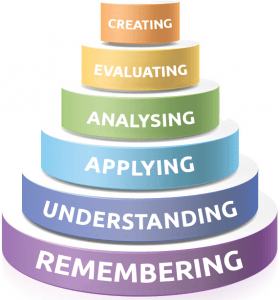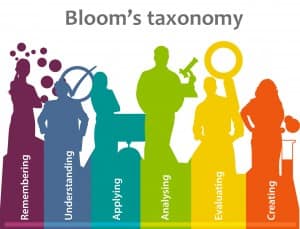There are six different levels of learning, which determine the way we think and process information. Those levels are remembering, understanding, applying, analysing, evaluating and creating. The first three levels are considered to be lower-order processes, understandably so, while the other three are more complex and more important for students.
 1. REMEMBERING – Maintaining a basic level of knowledge through rote learning and simple memorising. This may have been enough for primary school but as you advance in your education the more important it becomes for you to do something with the information you receive, instead of just keeping it stored in your memory or head.
1. REMEMBERING – Maintaining a basic level of knowledge through rote learning and simple memorising. This may have been enough for primary school but as you advance in your education the more important it becomes for you to do something with the information you receive, instead of just keeping it stored in your memory or head.
2. UNDERSTANDING – This means that you can recall what you’ve learned, present it in your own words and explain exactly what the process you are describing entails.
The first two levels of learning are important because they provide a good and solid foundation upon which you can continue building throughout the course of your education. Without them, creative learning and other more complex learning processes would not be possible.
3. APPLYING – Assessments, whether at your secondary school or university, require you to apply acquired knowledge in order to complete tasks and solve problems. Applying what you’ve learnt means that you are able to connect and relate pieces of information, solve problems and use abstract ideas in concrete situations.
4. ANALYSING – Having applied your knowledge, you will need to analyse it and break it down into its constituent parts. This process enables you to recognise and point out the relationship between the whole and its parts. You can read between the lines i.e. recognise implications, understand logical explanations and determine the relative hierarchy of information.
These two levels will help you determine how well-prepared you are for a test. If you can answer questions like why? what if…? and how would this work? you are able to apply and analyse what you’ve learnt.
5. EVALUATING – This level requires you to pass judgement, employ critical thinking, rely on your knowledge and skills to evaluate and make decisions, and to defend your opinions. In order to evaluate anything, you must think critically and present a truly deep understanding of the subject matter or of whichever process you are considering.
6. CREATING – This is the highest order of learning, thought and knowledge which combines parts in order to form a coherent and functional whole. In order to create something new, you need to demonstrate your capacity to be inventive, creative and original. This level as a synthesis of the other ones facilitates planning, designing and applying a new product, concept or function.
 The key to success is creative learning
The key to success is creative learning
Just as a strong foundation is needed to support a structure, building on that knowledge structure is essential because with every brick you add, the more you develop your critical and creative thinking, the easier you cope with new circumstances and the more fruitful your creative process will be. If the first two levels serve as a foundation, the second two enable us to explore and the final two allow us to invent and create.
Therefore, it is more than obvious which level of learning you need to reach in order to find success, not only in school but in life in general. Don’t let the desire to get good marks taint your learning efforts. For that, you needn’t go beyond the first two levels, beyond acquiring and repeating information. But if you want to create something new, something different, something original, in addition to having knowledge you need to get creative with it, use it, do more with it than simply store it. That’s why only true knowledge is the foundation and condition for success.
At International School, learning is geared towards success
At International School, we apply a creative approach to learning and teaching. Our teaching methods include mentorship, individual tutoring, and recognising talent, quality and the needs of every student.
Here, instead of solely focusing on good marks and test results, we teach our students to understand the subject matter, to use their competences in solving everyday problems, to be imaginative and create with all their heart in order to do something more with their knowledge, to expand their possibilities and accomplishments. Because the success of our students is also our success!


